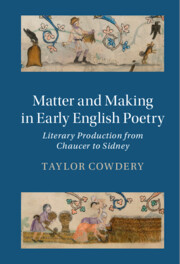Book contents
- Matter and Making in Early English Poetry
- Cambridge Studies in Medieval Literature
- Matter and Making in Early English Poetry
- Copyright page
- Contents
- Acknowledgments
- Abbreviations and Editorial Conventions
- Introduction
- Chapter 1 Words and Deeds in Chaucer
- Chapter 2 Gower and the Crying Voice
- Chapter 3 Hoccleve and the Force of Literature
- Chapter 4 Lydgate and the Surplus of History
- Chapter 5 Copy and Copia in Skelton
- Chapter 6 Wyatt’s Grace
- Epilogue
- Notes
- Bibliography
- Index
- Cambridge Studies in Medieval Literature
Chapter 6 - Wyatt’s Grace
Published online by Cambridge University Press: 15 June 2023
- Matter and Making in Early English Poetry
- Cambridge Studies in Medieval Literature
- Matter and Making in Early English Poetry
- Copyright page
- Contents
- Acknowledgments
- Abbreviations and Editorial Conventions
- Introduction
- Chapter 1 Words and Deeds in Chaucer
- Chapter 2 Gower and the Crying Voice
- Chapter 3 Hoccleve and the Force of Literature
- Chapter 4 Lydgate and the Surplus of History
- Chapter 5 Copy and Copia in Skelton
- Chapter 6 Wyatt’s Grace
- Epilogue
- Notes
- Bibliography
- Index
- Cambridge Studies in Medieval Literature
Summary
Thomas Wyatt lived in an environment where it was unwise, if not impossible, to speak one’s thoughts plainly. This chapter explores how Wyatt’s life at court, and his career as an ambassador, informed his tendency towards irony, obliquity, and indirection in his verse. As a close reading of his diplomatic correspondence demonstrates, Wyatt learned to speak in blank phrases, proverbs, and clichés, not just from his ambassadorial profession, but from contemporary writings on counsel, courtiership, and literary style. What is more, these influences seem to have inspired a theory of making in which, for Wyatt, the message of a poem is to be found, neither in its matter, nor in its form, but in its suggestive implications—in the sense of “grace,” to use his term, that the poem may evoke for its reader. By tracing the effects of this “grace” throughout Wyatt’s lyrics—and especially in poems such as “What Vaileth Trouth” and “They Fle From Me”—I argue that Wyatt anticipates later theories of aesthetic autonomy by shifting the reader’s attention away from the contingent materials of his poetry and towards the imaginative space that a poem may seem to open up.
- Type
- Chapter
- Information
- Matter and Making in Early English PoetryLiterary Production from Chaucer to Sidney, pp. 174 - 203Publisher: Cambridge University PressPrint publication year: 2023

